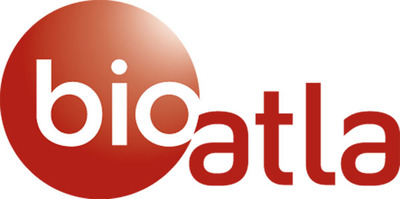

SAN DIEGO, Feb. 27, 2019 /PRNewswire/ -- BioAtla ®, LLC, a global clinical-stage biotechnology company focused on the development of Conditionally Active Biologic (CAB) protein therapeutics, will present pre-clinical data on BA3071 and BA3181, the company's novel CAB-CTLA-4 and CAB-EpCAM-ADC programs, at the 2019 American Association For Cancer Research (AACR) annual meeting in Atlanta, Georgia on March 29-April 3, 2019.

"These new data showcase the capabilities of our proprietary CAB technology, which we believe will expand the number of druggable protein targets and maximize both potency and safety in combination therapies, antibody drug conjugate (ADC) medicines, bispecifics and other targeted therapy formats for cancer treatments," stated Jay M. Short, Ph.D., Chairman, CEO and co-founder of BioAtla.
"We are particularly excited by these new preclinical data for our novel CAB-CTLA-4 program as a single-agent or in combination with checkpoint inhibitors. This novel CAB has the potential for an improved safety margin and therapeutic index thereby improving this important cancer therapy," said Scott Smith, President of BioAtla.
"These preclinical data suggest that our CAB technology may effectively address the issue of on-target off-tumor toxicity and allow leveraging the widely expressed and promising EpCAM target for cancer therapy," added Scott Smith.
BA3071 is a novel conditionally active CTLA-4 inhibitor. The CTLA-4 pathway is a key immune checkpoint pathway that provides a downregulating signal to T cells. Although inhibition of CTLA-4 has been shown to significantly improve the antitumor response, it may also lead to immune attack of healthy cells. To minimize on-target off-tumor toxicity, BioAtla applies its proprietary CAB technology with the intent to activate binding to the CTLA-4 receptor preferentially on T cells in the tumor microenvironment. The data to be presented at AACR indicate that our CAB-CTLA-4 molecule may have a superior safety profile when used in combination with PD-1 inhibitors and allow increased dosing levels to achieve superior efficacy to current anti-CTLA-4 therapy as a single agent or in combination with other anti-cancer therapies including immuno-oncology agents. The BA3071 IND filing is planned for mid-2019. A Phase 1/2 multi-center, open-label study designed to evaluate the safety, tolerability, pharmacokinetics, immunogenicity and antitumor activity of BA3071 alone and in combination with a PD-1 inhibitor is anticipated to start in H2 2019.
BA3181 is a novel conditionally active EpCAM targeted antibody drug conjugate (CAB-EpCAM-ADC). EpCAM is expressed at high levels exclusively in epithelia and epithelial-derived neoplasms, making it a suitable target for many important solid tumor types and cancer stem cells. EpCAM expression on normal tissues limits its utility as a target for therapeutic antibodies and ADCs due to the potential effects on normal epithelial throughout the body. Using our CAB technology, BioAtla has developed CAB antibodies to EpCAM that reversibly bind to recombinant EpCAM and EpCAM expressing cells under select conditions that are present in the tumor microenvironment but not in normal tissues. In vitro and in vivo efficacy data for several anti-EpCAM antibodies and ADCs will be presented and suggest that conditionally active EpCAM ADCs generated using the CAB technology provided drug candidates, including BA3181, that have the potential to have an increased safety margin and therapeutic index in the clinic.
Abstract Selected for Oral Presentation:
19-A-6330-AACR: Potent CAB CTLA-4 antibody to reduce immune side effects and toxicities associated with single agent and combination cancer immuno therapies
Abstract Control Number: 6215
Session Title: Rational Combinations of Immunotherapy
Session Date and Time: 4/1/2019 3:00PM - 5:00 PM
Presenter: William Boyle, Ph.D., Chief of Translational Medicine, BioAtla LLC
Abstract Selected for Poster Presentation
Novel conditionally active biologic (CAB) antibody targeting EpCAM demonstrates anti-tumor efficacy in vivo
Session Title: New Anticancer Agents
Session Date and Time: Sunday Mar 31, 2019 1:00 PM - 5:00 PM
Location: Georgia World Congress Center, Exhibit Hall B, Poster Section 14
Poster Board Number: 17
Permanent Abstract Number: 356
Session information is available online via the Annual Meeting Itinerary Planner through the AACR website at www.aacr.org.
About Conditionally Active Biologics (CABs)
Conditionally Active Biologic proteins are generated using BioAtla's proprietary protein discovery, evolution and expression technologies. These proteins can be monoclonal antibodies, enzymes and other proteins designed with functions dependent on changes in micro physiological conditions (e.g., pH, oxidation, temperature, pressure, presence of certain ions, hydrophobicity and combinations thereof) both outside and inside cells.
Studies have shown that cancerous tumors create highly specific conditions at their site that are not present in normal tissue. These tumor microenvironments (TMEs) are primarily influenced by the characteristic glycolytic metabolism associated with cancer cells, including for those cells under aerobic conditions referred to as the Warburg Effect. CAB proteins are designed to deliver their therapeutic payload and/or recruit the immune response in specific and selected locations and conditions within the body and to be active only in the presence of a particular cellular microenvironment. In addition, the activation is designed to be reversible, to repeatedly switch 'on and off' should the CAB move from a diseased to a normal cellular microenvironment and vice versa, thereby widening the therapeutic index. CABs can be developed in a variety of formats including antibodies, antibody drug conjugates (ADCs), bispecifics, chimeric antigen receptor T-cells (CAR-Ts) and combination therapies.
About BioAtla , LLC
BioAtla is a global clinical-stage biotechnology company headquartered in San Diego, California, and with operations in Beijing, China. BioAtla develops novel monoclonal antibody and other protein therapeutic product candidates designed to have more selective targeting, greater efficacy, and more cost-efficient and predictable manufacturing than traditional antibodies. BioAtla has two programs currently in Phase 1/2 clinical testing in the US, BA3011 a novel conditionally active AXL-targeted antibody-drug conjugate (CAB-AXL-ADC) and BA3021 a novel conditionally active ROR2-targeted antibody-drug conjugate (CAB-ROR2-ADC), in addition to two licensed, royalty-bearing clinical stage CAB programs.
Contact:
Richard Waldron
Chief Financial Officer
BioAtla, LLC
rwaldron@bioatla.com
858.356.8945
SOURCE BioAtla, LLC
